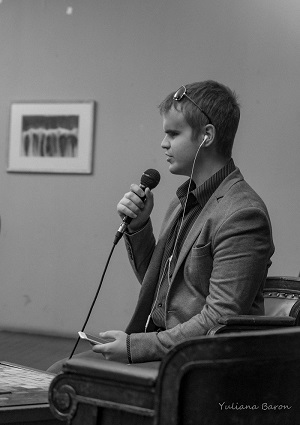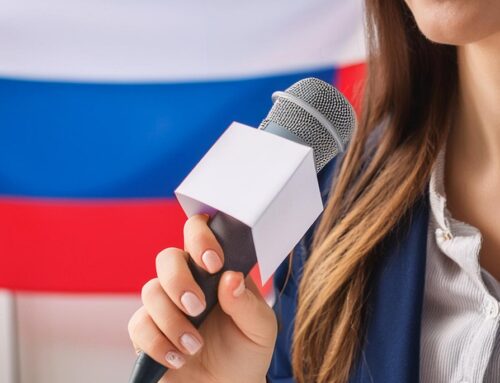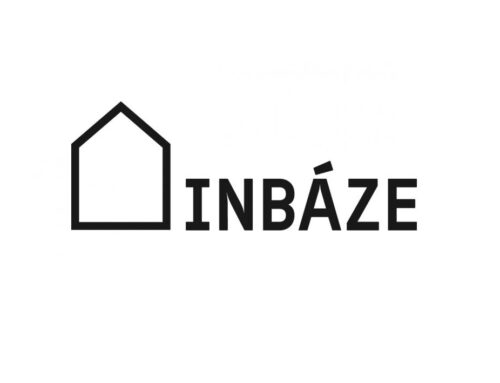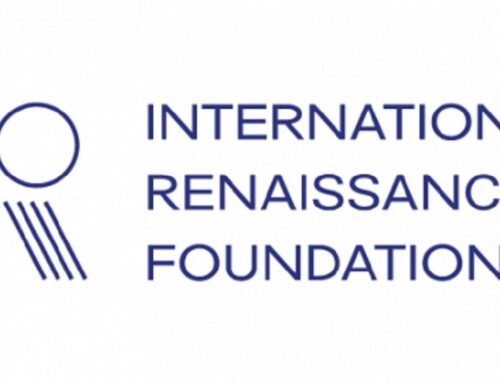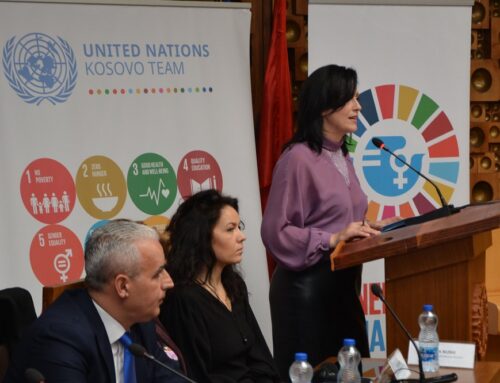Dilian Manolov from Plovdiv, Bulgaria is a young inequality fighter with a diverse background. He is a clinical and organizational psychologist, an actor, a social entrepreneur and a promoter of the rights of people with disabilities.
Enabling equality and overcoming barriers for inclusion of people with disabilities still remain a challenge in the Balkan countries, including Bulgaria. Segregation, lack of integration and social discrimination are just some of the challenges that people with disabilities like Dilian have to face everyday. However, he has decided to challenge them and offer his contribution in helping the others to do so. This is his story.
1. How is being a person with disabilities in Bulgaria and what do you think is the most challenging part of it?
To be a blind person like me, or a person with disabilities in Bulgaria is like being a member of a closed group. People with disabilities still live within their large groups and they tend not to interact with the others. This lack of interaction makes awareness campaigns very hard. A very important fact is that actually a lot of people try to be helpful out on the streets. A common question that is discussed among people with disabilities is: “How to avoid getting help or assistance for things I don’t need?” According to me, the real challenge that exists is that you always have to be proactive and remind people that you can be independent, but sometimes you just do not have the energy to deal with it.
2. What were the difficulties you faced throughout your education?
Throughout my education I have experienced mainly two challenges. Firstly, for almost 90% of my teachers and trainers, I was the first blind student they had ever worked with. I had to propose them methods of how to get me involved and how I could do my exams and home work. Secondly, I faced real difficulties in terms of socialization process with my classmates and fellow students. I started going out with my classmates only after I attended university. My main social activity during the high school years was attending acting classes, from where my main group of friends comes from. Theater became very important for me and it has been part of life ever since. I did different types of theater and I also wrote some theatrical plays. Currently, I am working on a comedy-sarcastic mono play, which I want to produce, codirect and act in.
3. What are the challenges in terms of employment and how did this affect your decision for self-employment?
In Bulgaria, the unemployment rate among people with disabilities is between 93 to 97 %. I can say that there is a lot of stigma, miscommunication and pressure between people with disabilities and businesses. Unfortunately, the Human Resources staff terminates interviews and selection processes for persons with disabilities. I constantly searched for a job for more than two years. I literally had over 200 interviews for all ranges of companies, jobs and positions. At some point, I dumbed the idea of ever getting a job and I went for private and social entrepreneurship. I established a consulting business and I succeeded, but I want to outline two things. Entrepreneurship was never my way to go, it was forced on me because I couldn’t get a job. The second thing is that my parents supported my business financially, because banks in Bulgaria are even more discriminative then the businesses when it comes to supporting people with disabilities.
4. You established a Foundation. Why did you decide to establish your own Foundation and how is that working?
Me and the other two co-founders of Vizioner Foundation are probably among the top 5 most active blind people in our country. We know English and at least one other language, we educated ourselves in and outside of Bulgaria, and we truly believe that our professional and personal experience would be valuable to help other people. The aim of our organization is to teach skills to other people like us, close the communication gap (with people and businesses), empower and help them get independent. I used the experience I had from hosting and coproducing my own TV rubric to start a project in story telling which resulted to be really successful.
After seeing how we managed to spark interest for blind photography in our first international Erasmus project in 2019, we are even more pumped to achieve and deliver more. The work for the Foundation just brought me the most prestigious recognition in Bulgaria for social work and achievement. It is called 40 under 40, where 40 people under age of 40 are recognized for their achievements in different areas.
5. You also had an experience at United Nations as UN youth delegate of Bulgaria. Can you tell me more about the experience?
UN Youth Delegate is a program of UN to empower young active people to be part of UN policy making. Me and another college represented Bulgarian youth in the 73-rd UN General Assembly, as well as in the Social & Economic Forum in 2019. We organized special events regarding work and education for people with disabilities, and regarding Internet privacy. The UN experience was the most challenging, stressful as well as the most rewording and empowering experience I have ever had. It made me feel as if I had some power to influence things at an international level and enable change.
6. According to you, how accessible and youth friendly are international non-profit sector?
Well, my experience is positive because the UN youth delegate program lead to another wonderful experience at UNICEF, where I actually hold 3 different positions. First, UNICEF invited me to be a Youth Advocate for the rights of persons with disabilities. Then in December 2019, I was nominated for being Social and Behavior Change Youth Champion. In April 2020, I became a Social and Behavior Change consultant for UNICEF country office in Bulgaria.
Currently I am working on recommendations for mental health for the youth, and on creating a support framework for youth with disabilities in emergency situations. So, coming back to your question yes because of my experience I can say that international non-profit sector is accessible and youth friendly. It wasn’t easy but I made it.
